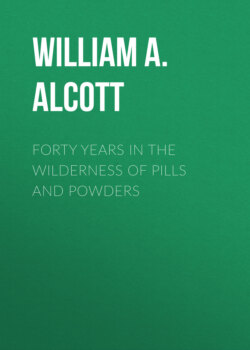Читать книгу Forty Years in the Wilderness of Pills and Powders - William A. Alcott - Страница 51
На сайте Литреса книга снята с продажи.
OSSIFIED VEINS.
ОглавлениеTable of Contents
While I was studying medicine with my new or second master, I had several excellent opportunities for studying health and disease through the medium of the doctor's patients.
One of them was a swaggering man of wealth, about sixty-three years of age. He had long lived very highly, had eaten a good deal of roast beef, and drunk a good deal of wine, and had almost swum in cider. He was in short, one of that class of men who "go off" in very many instances, at the grand climacterical period, some of them very suddenly.
"Doctor," said the general, exhibiting himself in full size and the boldest relief, "I want to be bled."—"What do you want bleeding for?" said the doctor. "Oh," said he, "bleed me, and you will see. You will find my blood in a very bad state."—"Your blood, general, was always in a very bad state," said the shrewd son of Galen, with a sardonic grin. "None of your fun, doctor," was the prompt reply; "I must be bled. I have headache and giddiness half the time, and must have some blood taken."—"Very well," said Dr. S. "It shall be as you desire. Here, my son, bring me a bowl."
An older student assisted, while I, glad of the privilege, kept aloof, and at a distance. The general's brawny arm was mauled a long time; and even then not much blood was obtained. At last the attempt was given up, and the man returned home, though not, as might have been expected, very well satisfied.
When he was gone, I inquired of Dr. S., as modestly as I could, what serious difficulties he had to encounter in his attack on Gen. Upham's arm. "Why was it," said I, "that you could get no more blood?" "For the plainest reason in the world," he answered; "his veins were all ossified."
I was quite satisfied at the time, with this answer; for I knew so well the habits of Gen. U. that I stood ready to believe almost any thing in regard to him, especially when it came from a highly respectable source. Yet I have often suspected since that time, that there was a serious mistake made. Ossified or bony arteries, even at this great distance from the heart, in such a man, ought not to excite surprise; but these would hardly be met with in attempting to open a vein, since the arteries are much more deeply imbedded in the flesh than the veins are. And as for ossified veins themselves, especially in the arm, they are seldom if ever heard of.
You may wonder why I did not satisfy my curiosity at the time, by making diligent inquiry at the proper source of information; and I almost wonder too. But, in the first place, my curiosity did not rise so high on any occasion whatever, as it has since done. For, though I was hungering and thirsting for knowledge thirty years ago, my solicitude to know has so increased with increasing years that my present curiosity will admit of no comparison with the former. Secondly, I was exceedingly diffident. Thirdly, my mind was just then fully occupied with other things. And lastly, whenever I was in the company of Dr. S., both while I remained in the office and subsequently, it was only for a very short time, perhaps a single half hour, at best; and we had always so many other things to talk about, that Gen. U. and his ossified veins never entered our minds.
However, it was not many years afterward that I heard of the old general's death. Of the manner of his exit except that it was sudden, I never heard a word, up to this hour. It is by no means improbable that there was ossification about his heart, for he was a very fit subject for ossification of any parts that could be ossified. I do not know, indeed, that a post mortem examination was ever made; the family would doubtless have opposed it. The uses of the dead to the living are in general very little thought of.
Such cases of disease are, however, a terrible warning to those who are following in the path of Gen. Upham. They may or may not come to just such an end as he did, but of one thing we may be well assured; viz., that the wicked do not live out half their days, or, in other words, that sins against the body, even though committed in ignorance, can never wholly escape the heaven-appointed penalty of transgression. "The soul that sins must die." For no physical infraction of God's holy, physical laws, do we know of any atonement. We may indeed, be thankful if we find one in the moral world or anywhere else.
